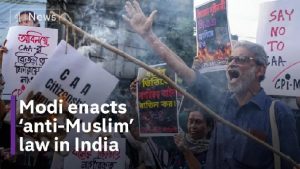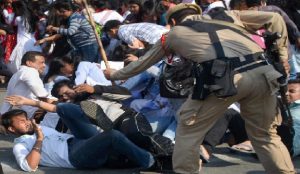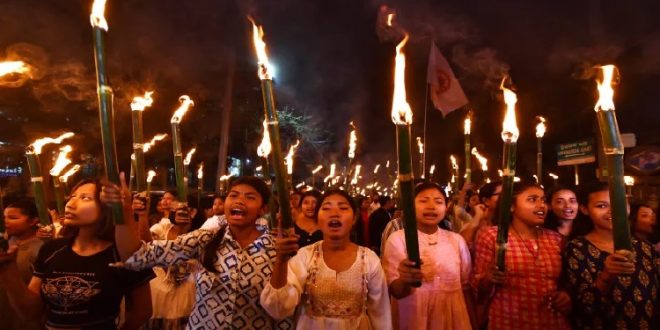15-03-2024
Bureau Report + Agencies
NEW DELHI: Sporadic protests have erupted across India against the implementation of the controversial Citizenship Amendment Act (CAA), sparking renewed concerns about its discriminatory impact on Muslims.
Narendra Modi government faces backlash as demonstrations broke out in various states, including Assam and Tamil Nadu, just days before a general election is announced.
 In Assam and Tamil Nadu, demonstrators voiced their opposition to the CAA, with protests involving burning copies of the law and shouting slogans against its implementation. Opposition parties in Assam have called for a statewide strike in response to the law.
In Assam and Tamil Nadu, demonstrators voiced their opposition to the CAA, with protests involving burning copies of the law and shouting slogans against its implementation. Opposition parties in Assam have called for a statewide strike in response to the law.
The Communist Party of India (Marxist) has joined the opposition, calling for state-wide protests in Kerala against what they describe as a “communal and divisive law.”
In Delhi, where protests against the CAA were concentrated in 2019, authorities remain on alert for potential violence, implementing measures to prevent unlawful gatherings and increasing police presence in sensitive areas.
The CAA grants Indian citizenship to non-Muslim refugees from three Muslim-majority South Asian nations, with rights activists and Muslim groups expressing concerns about its discriminatory nature, particularly when combined with a proposed national register of citizens.
Protests have erupted in parts of India over the Narendra Modi government’s implementation of a controversial citizenship law ahead of national elections, as security forces rushed to areas of the national capital that had previously been epicentres of large demonstrations against the legislation.
 The notification of the Citizenship (Amendment) Act (CAA) on Monday introduces the country’s first religion-based citizenship test after decades of a constitutional setup that swears at least officially by secularism. Critics say the law discriminates against Muslim asylum seekers.
The notification of the Citizenship (Amendment) Act (CAA) on Monday introduces the country’s first religion-based citizenship test after decades of a constitutional setup that swears at least officially by secularism. Critics say the law discriminates against Muslim asylum seekers.
The amendment expedites citizenship for refugees from India’s neighbouring nations who are Hindu, Sikh, Christian or from other religious minorities but not if they are Muslim. As a result, the benefits do not extend to the Rohingya from Myanmar, persecuted Ahmadiyya from Pakistan, or the Hazara from Afghanistan, for instance.
“The CAA has always been about creating two tiers of citizenships in India: non-Muslims and Muslims,” said Yogendra Yadav, a political scientist and activist who was closely associated with the anti-CAA protests. “It is voter polarisation (by the BJP) before elections but are we surprised?”
Parliament passed the CAA in 2019, but Modi’s Bharatiya Janata Party (BJP) government has since delayed its implementation. Months-long protests against the law brought parts of New Delhi to a standstill, as the capital was hit by sectarian violence in early 2020. More than 100 people were killed in the violence across the country, mostly Muslims.
 Pressmediaofindia
Pressmediaofindia




